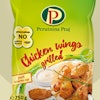“If it takes the other side five seconds to make a claim and it takes you five minutes to respond or shut it down, you’ve lost,” said Lisa Picard, vice president of scientific and regulatory affairs for the National Turkey Federation, when dealing with regulatory issues during her poultry processing regulatory update presentation at the “Salmonella and Campylobacter Control in Poultry Production and Processing – Meeting Food Safety Goals” program at the 2019 International Production & Processing Expo (IPPE). She reflected that there was a lot of good news regarding the regulatory front last year in Washington and discussed Salmonella categories for turkeys, Animal and Plant Health Inspection Service funding for animal and pest disease control, the North American Free Trade Agreement and the Canadian and Mexican trade market for turkeys, and other topics.
During his presentation, “On-Farm Control of Salmonella and Campylobacter,” Dr. Charles Hofacre, owner of Southern Poultry Research Group, said that Salmonella and Campylobacter are normal flora in turkeys. He discussed his experience with Salmonella Heidelberg and Salmonella Reading, commenting that they have been around in turkeys for a long time. However, Dr. Hofacre remarked that there is very little information on Campylobacter in turkeys worldwide. He reviewed information gleaned from a grant that he and others had received to study Salmonella and Campylobacter on-farm a few years ago, observing that the trends were still similar even though the data was dated.
Dr. Todd Applegate, department head and professor for the Poultry Science Department at the University of Georgia, presented on “Feed Additives to Modulate Salmonella and Campylobacter Prevalence.” He remarked that he could present on the topic in about 10 seconds stating, “I don’t think we have any good experimental models to look at feed additives for Salmonella and Campylobacter control.” Dr. Applegate explained this comment by alluding to how experimental models have been used and why they may or may not be fully representative of the continuum of that spectrum of the system.
Hank den Bakker, assistant professor in the Center for Food Safety at the University of Georgia, presented on “Poultry Gut Microbiome – Key to Pathogen Control?” He discussed the technical details of microbiome research, the tools that are currently being used to study microbiome, how this applies to pathogens, and how certain pathogens might be missed depending on the technique used.


















